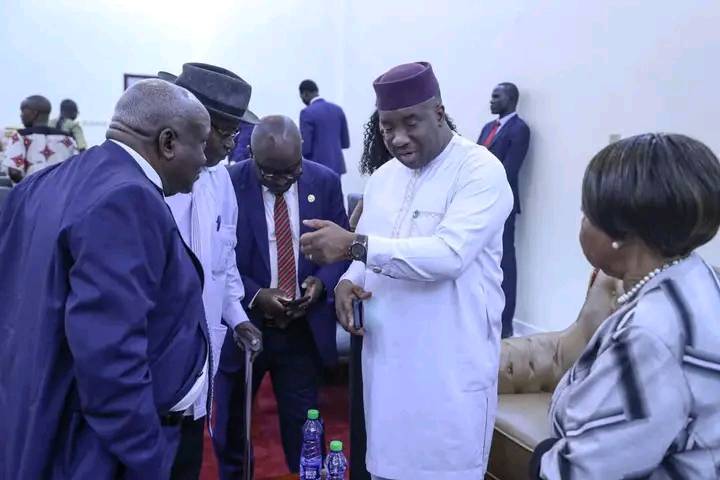
The African Union’s Panel of the Wise (PoW) arrived in Juba on Wednesday for a crucial peace mission aimed at de-escalating the ongoing political and security tensions in South Sudan.
The high-profile delegation is expected to hold discussions with key stakeholders and facilitate dialogue in an effort to maintain stability and foster reconciliation among the country’s political leaders.
The delegation is led by former Burundian President Domitien Ndayizeye and former Kenyan Judge Effie Owuor.
Their four-day visit was initiated by the African Union Commission (AUC) Chairman, underscoring the regional body’s continued commitment to supporting the full implementation of the Revitalized Agreement on the Resolution of the Conflict in South Sudan (R-ARCSS).
Their primary focus will be engaging political actors and civil society groups to ensure the peace agreement remains on course despite mounting challenges.
Upon arrival at Juba International Airport, the delegation was received by senior government officials and AU representatives before proceeding to a high-level meeting with President Salva Kiir at the State House.
This engagement marked the beginning of a series of consultations aimed at addressing pressing political issues, particularly the rift between the ruling Sudan People’s Liberation Movement (SPLM) and the opposition party, SPLM-IO, led by First Vice President Dr. Riek Machar.
Addressing the press shortly after the meeting, former President Ndayizeye reaffirmed the AU Panel of the Wise’s dedication to ensuring the successful implementation of the peace accord.
“They have assured us that they are committed to implementing the revitalized peace agreement,” Ndayizeye stated. “They have assured us that they are in the process of resolving the issue concerning the SPLM-IO and the First Vice President, Dr. Riek Machar, according to the law.”
Political tensions have escalated in recent months, with disputes over security arrangements, governance, and the upcoming elections threatening to derail the fragile peace process.
Observers have raised concerns over delayed security sector reforms and the lack of trust between key political players, which could reignite conflict if left unaddressed.
Civil society groups have expressed high expectations from the AU mission, emphasizing the need for firm commitments from political leaders to uphold the cessation of hostilities agreement.
Edmund Yakani, Executive Director of the Community Empowerment for Progress Organization (CEPO), stressed the significance of the Panel’s role in ensuring peace and stability.
“My expectation is that the Panel of the Wise will secure our leaders, especially the President and First Vice President, to declare their commitment to the cessation of hostilities agreement,” Yakani stated.
Yakani also highlighted the importance of addressing the status of political detainees, advocating for legal due process and the release of individuals held without formal charges.
He further urged the delegation to prioritize constructive dialogue among all signatories of the peace deal to foster lasting reconciliation.
“The involvement of civil society organizations, religious leaders, women, and journalists in the peace talks will enhance transparency and inclusivity in the peace process,” he added.
The AU Panel of the Wise’s arrival came at a critical juncture for South Sudan, as the nation prepares for its first elections since gaining independence in 2011.
Their engagements over the next four days will be pivotal in shaping the country’s trajectory, determining whether South Sudan can successfully transition from post-conflict recovery to lasting peace and democratic governance.
As the delegation continues its mission, political analysts believe that its success will depend on the willingness of South Sudan’s leadership to make genuine compromises and prioritize national interests over political rivalries.
The coming days will be closely watched, with hopes that the AU-led mediation will bring renewed momentum to the implementation of the peace agreement and prevent further instability in Africa’s youngest nation.

